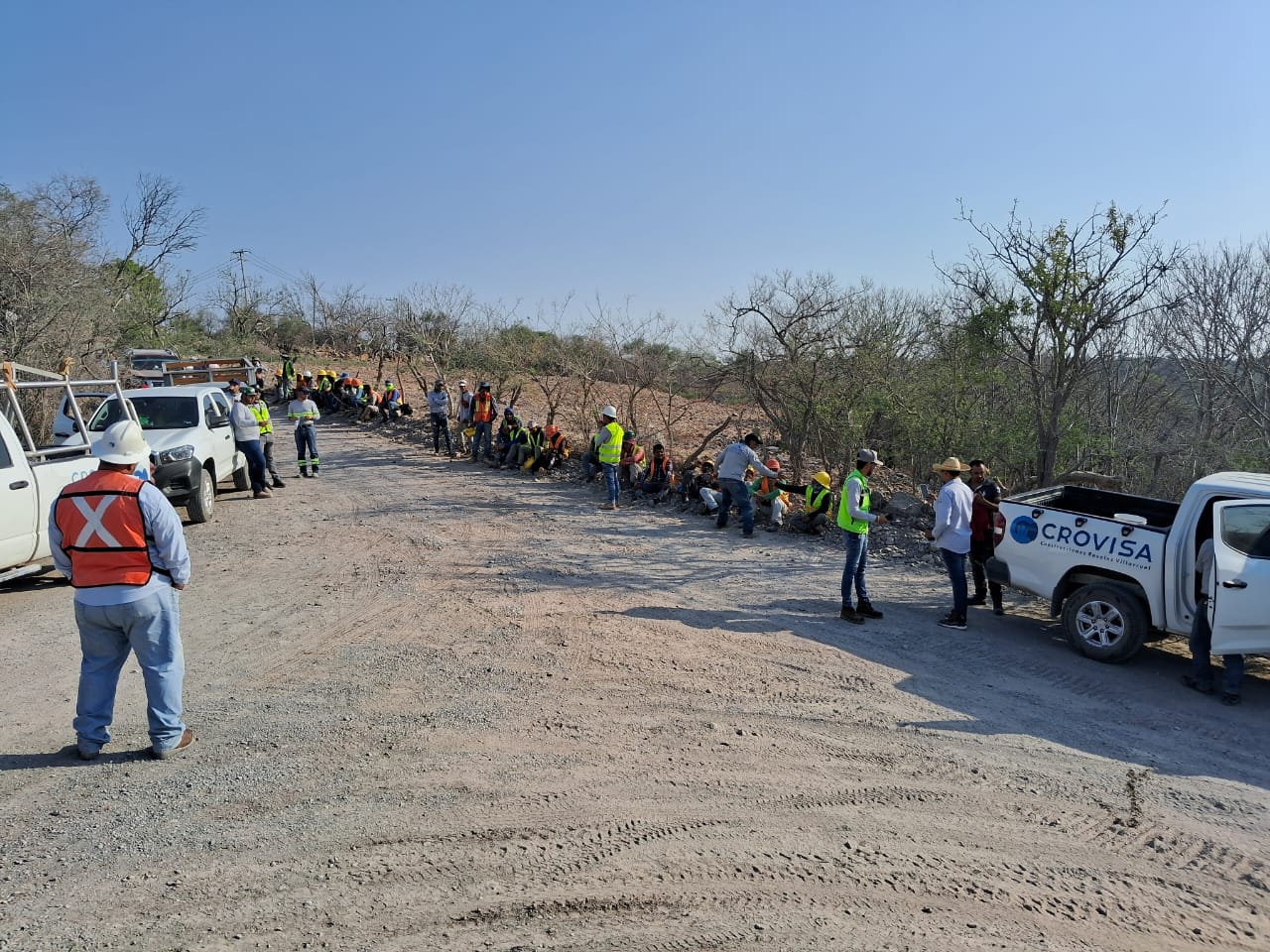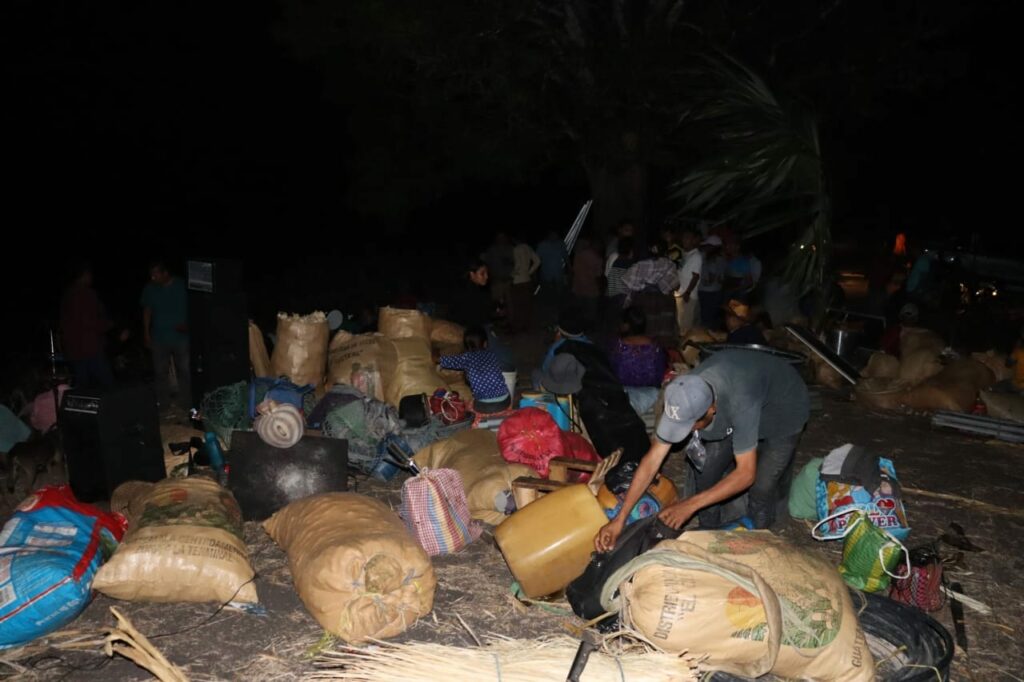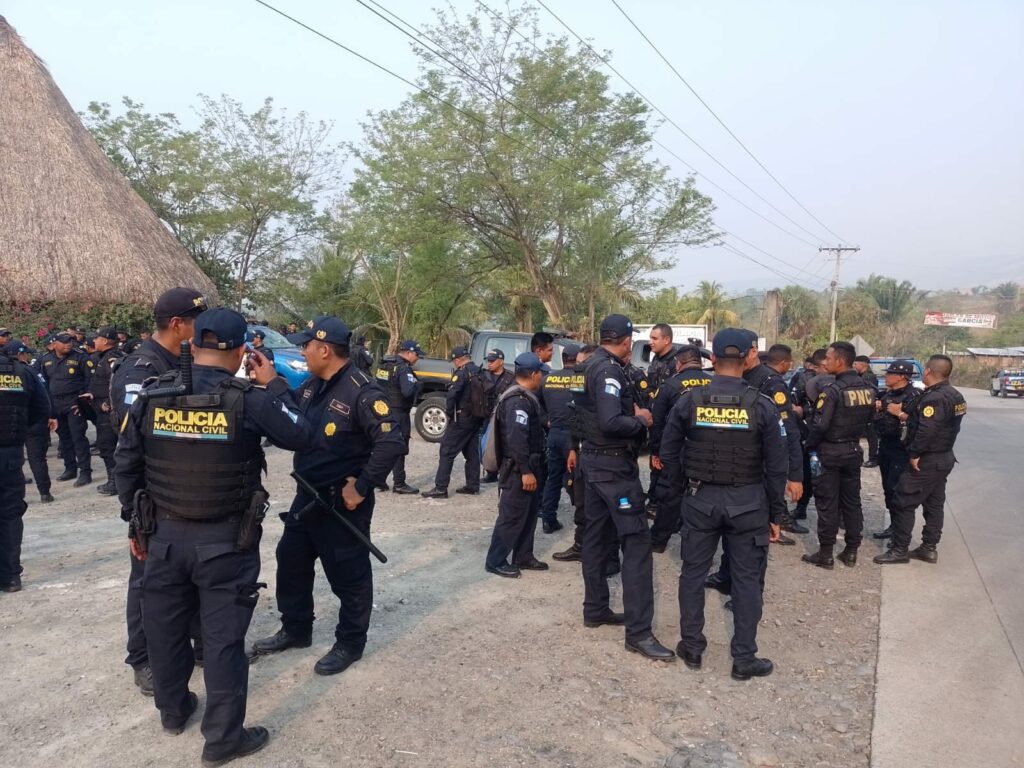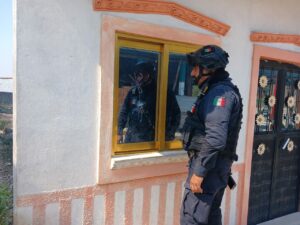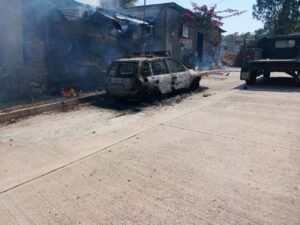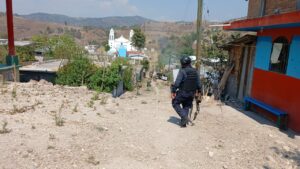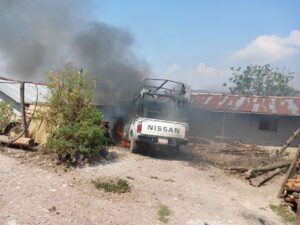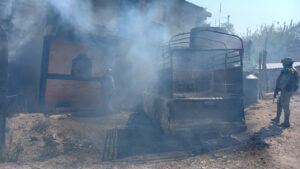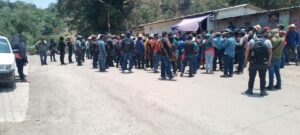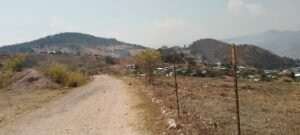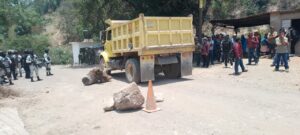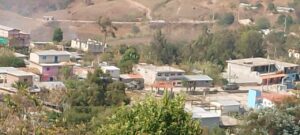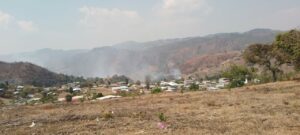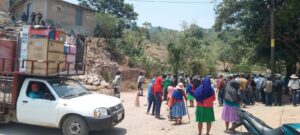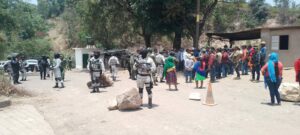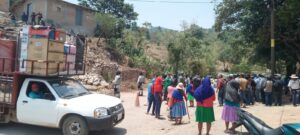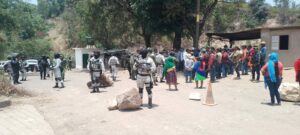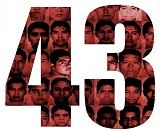
Zapotecas reclaman por afectaciones y militarización en Línea K del Corredor Interoceánico
Fuente: Avispa Midia
Por Aldo Santiago
En portada: Pobladores de Unión Hidalgo se manifestaron pacíficamente para detener la tala masiva de árboles en tierras comunales derivado de los trabajos de rehabilitación de la Línea K del CIIT.
En la comunidad zapoteca de Unión Hidalgo, municipio de Juchitán en el Istmo de Tehuantepec, pobladores reclaman por las afectaciones ambientales que van dejando a su paso las obras de rehabilitación de la Línea K, una de las tres vías de transporte que integran el proyecto del Corredor Interoceánico, las cuales también conectarán a otros megaproyectos como el Tren Maya, en la Península de Yucatán y la refinería en Dos Bocas, Tabasco.
De gran relevancia para el transporte de mercancías, las vías férreas erigidas desde inicios del siglo XX y cuyo trayecto fue interrumpido en 2005 por los daños del huracán Stan, actualmente son rehabilitadas por el organismo Corredor Interoceánico del Istmo de Tehuantepec (CIIT), perteneciente a la Secretaría de Marina (Semar).
Los trabajos de la Línea K corren a cargo, desde febrero del 2023, de la empresa Grupo Ferrocarrilero del Sureste (GFS), encargada de las obras a lo largo de 472 kilómetros de vías que conectan Ixtepec, en el Istmo oaxaqueño, a Ciudad Hidalgo, en Chiapas.
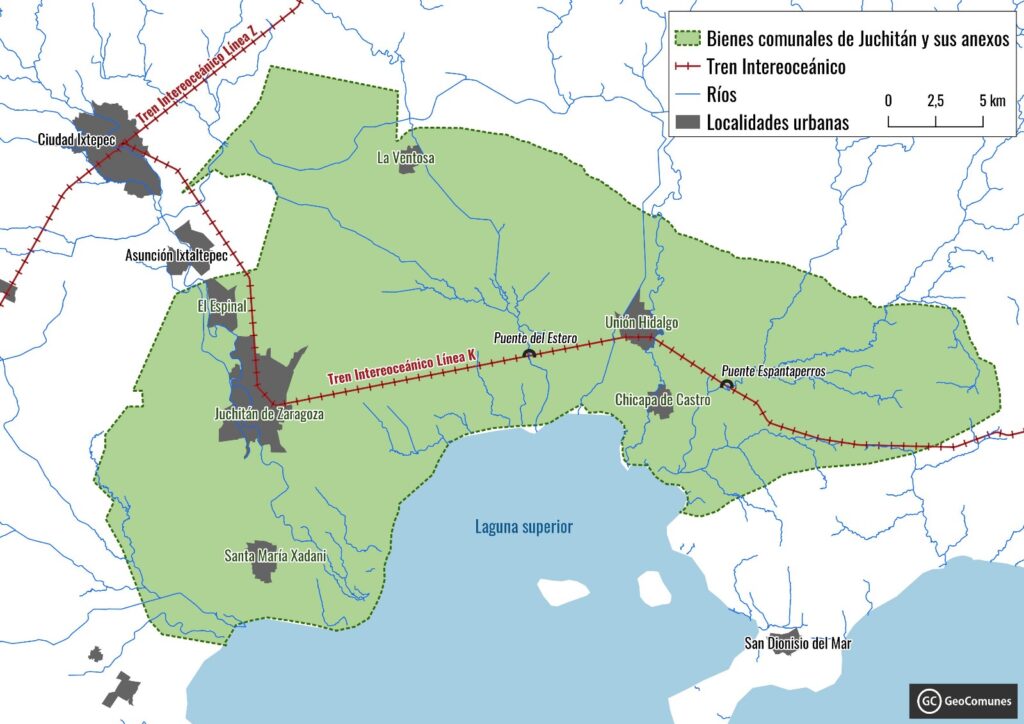
Pobladores de Unión Hidalgo perciben estas obras como una reconstrucción de gran magnitud pues implican la sustitución de todos los materiales que componen las vías, así como de locomotoras, estaciones y otras instalaciones asociadas.
En conversación con Avispa Mídia, Édgar Martín, defensor de derechos humanos en asuntos ambientales y habitante de la comunidad binizaá, relata que los trabajos incluso proponen la edificación de destacamentos militares a cargo de la Secretaría de Marina, cuyos detalles apenas retoman a cuentagotas pues las autoridades no han informado a la población local.
Por esta situación, Martín cuenta que integrantes de la comunidad han solicitado información para conocer los alcances y posibles afectaciones de las obras, sobre todo, los detalles de la Manifestación de Impacto Ambiental (MIA), documento indispensable para autorizar los permisos ambientales y dar luz verde a las obras. El defensor recuerda que, en primera instancia, recurrieron al CIIT, pero nunca recibieron respuesta.
Por su parte, Óscar Marín, comunero y representante de bienes comunales de Unión Hidalgo, detalla que fue durante una reunión, a principios del 2024 con mandos de la Semar, que los militares se negaron a compartir la MIA y argumentaron que la solicitud debía ser dirigida a la Secretaría de Medio Ambiente y Recursos Naturales (Semarnat).
Los pobladores así lo hicieron. Martín describe que fue una sorpresa la respuesta de las autoridades ambientales pues argumentaron que exentaron a la Semar de presentar la MIA. Para el defensor esta situación es alarmante debido a que este ramal es la línea más larga del Corredor y se extiende sobre una llanura costera, donde existe la amenaza de afectación a ecosistemas como manglares, esteros y ríos.
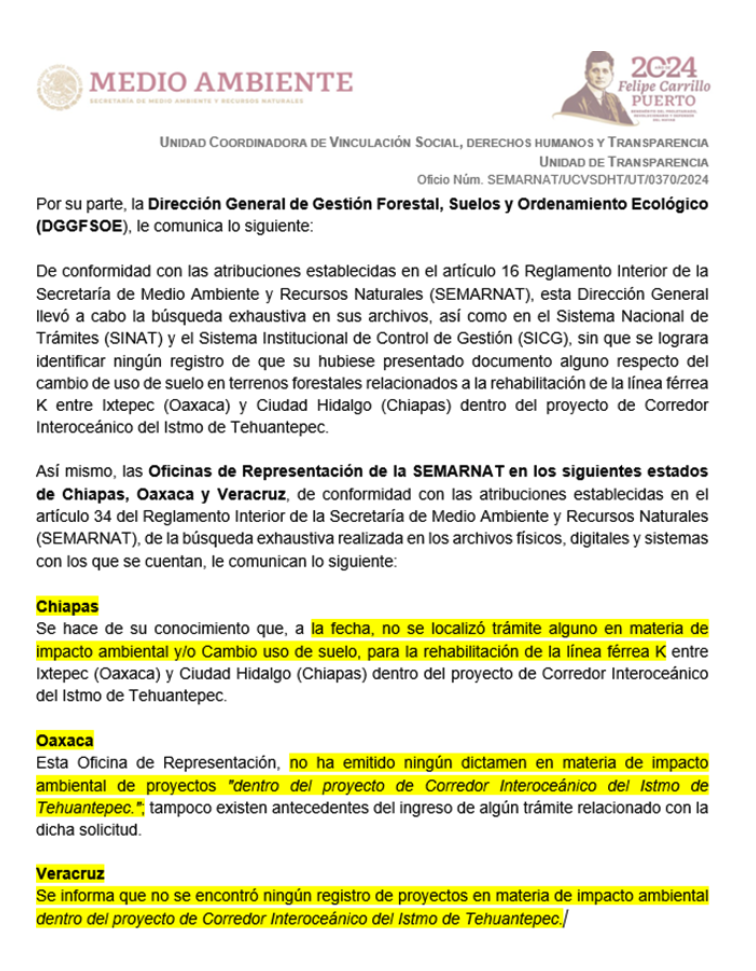
“Descubrimos que no existe la MIA, algo ilegal, porque la única excepción posible es cuando hubo una manifestación de impacto ambiental previa, en este caso no lo hay. Legalmente no era posible que se exentara”, reclama el defensor.
El gobierno mexicano ha anunciado que se pretende terminar los trabajos en junio próximo, para con ello realizar pruebas en agosto y poder cumplir con la agenda del presidente Andrés Manuel López Obrador, quien planea inaugurar la primera fase de las obras con una visita al Istmo durante septiembre, a menos de un mes de finalizar su cargo.
Afectaciones
El paso de la Línea K por la comunidad de Unión Hidalgo atraviesa a lo largo 26 kilómetros por tierras comunales. Según Edgar Martín esto representa el 6% del total de las vías férreas en una sola población donde los impactos pueden afectar a cuerpos de agua, que en su caso albergan dos esteros, un río y más de 20 arroyos.
Además de que no existen estudios sobre las afectaciones y las acciones para remediarlas, para el comunero Óscar Marín, las labores cotidianas como la soldadura para los puentes está dejando una cantidad de residuos de metales, aceite usado y otros desechos los cuales, asegura, la Semar se niega a sanear tras la conclusión de sus labores.
El comunero resalta también los impactos de deforestación con las labores de la Semar y GFS. “Desde el principio de las obras arrasaron con todos los arbolitos alrededor del derecho de vía”, relata.
Edgar Martín complementa que, de acuerdo al registro de la comunidad, contabilizan más de 10 mil árboles talados y resalta que, fue en enero del 2024, cuando habitantes de Unión Hidalgo se percataron del retiro de cientos de árboles en el Bosque Comunal El Palmar -tierras de uso común de gran importancia para la comunidad indígena-, lo que provocó su indignación y los llevó a bloquear el campamento de trabajadores para detener la deforestación masiva.
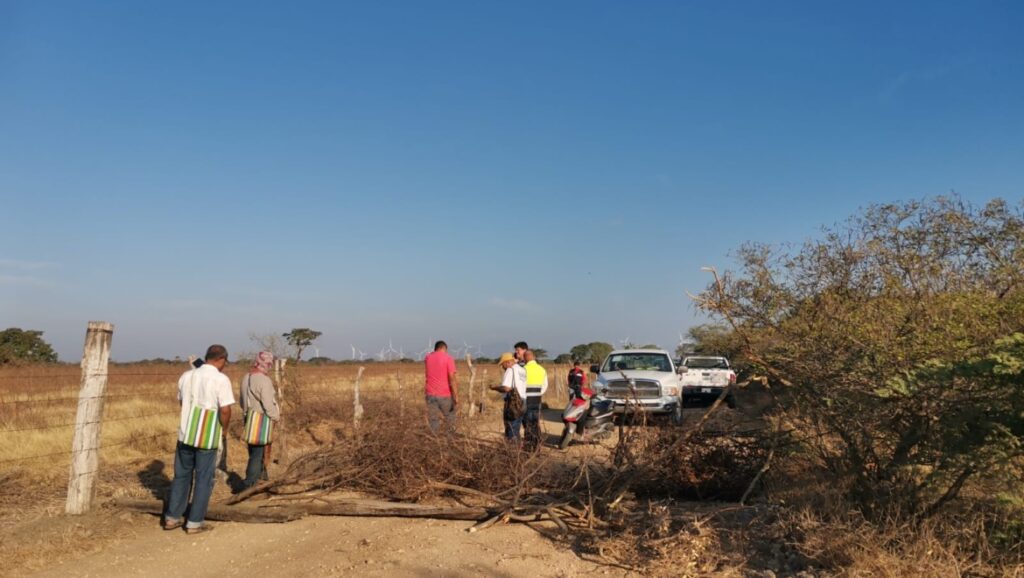
Debido a la protesta es que, en abril, la Semar se comprometió a gestionar ante la Secretaría de Fomento Agroalimentario y Desarrollo Rural de Oaxaca para la producción y reforestación con 16 mil árboles. Mediante un oficio, la Semar solicita la intervención de la autoridad estatal para “mitigar el impacto ambiental por la renovación de la Línea K en la comunidad Unión Hidalgo”. Los pobladores aún esperan la finalización de los trabajos para concretar la reforestación con especies nativas.
Aunado a la deforestación, para el defensor Martín las mayores afectaciones ocurrieron en los cerros al sur de la comunidad. Esto debido a que la insuficiencia de materiales pétreos para cambiar la totalidad del terraplén llevó a la Semar a extraer material pétreo del banco “El Barrancón”, el cual estaba dañando sitios dentro de las tierras comunales de la comunidad zapoteca.
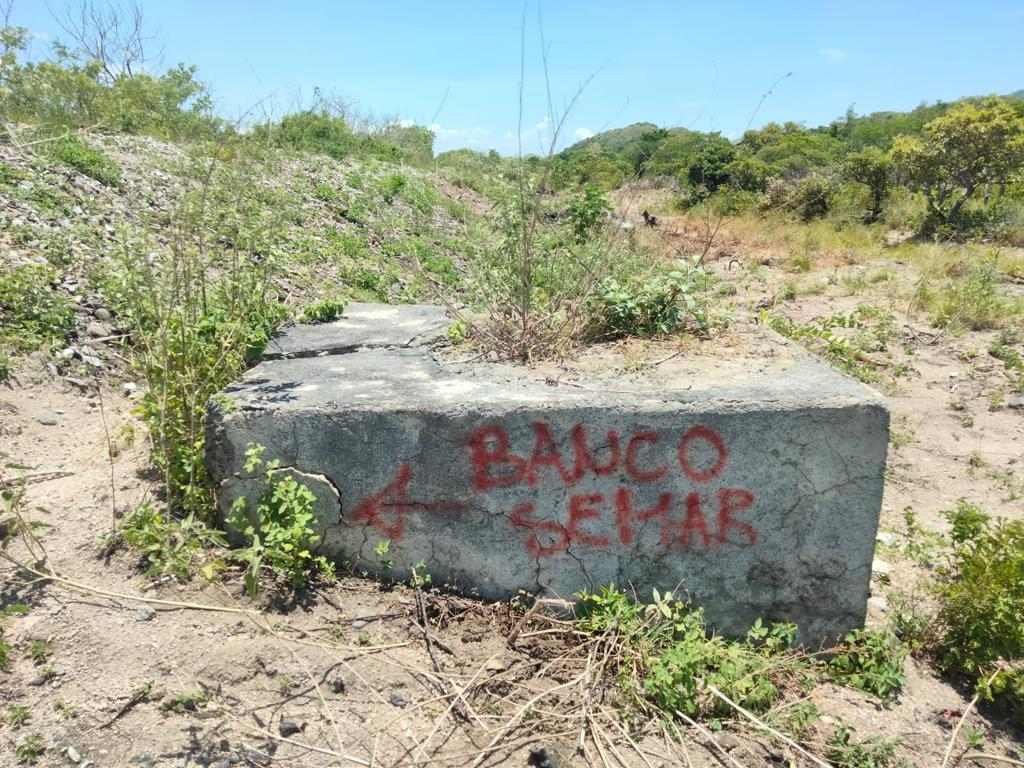
“Hubo un momento en que estaban operando con 400 volteos (transportes de carga) de doble capacidad. Estaban atacando dos cerros al mismo tiempo y eso era un impacto de imposible reparación”, sostiene.Ante ello, en octubre del 2023, después de descubrir que las autorizaciones en materia de impacto ambiental del banco no estaban vigentes, habitantes denunciaron la extracción ilegal de material para las obras.
Tras los reclamos de la población binizaá fue que la Semar y el CIIT convocaron a una reunión para entablar diálogo y contener la protesta, pero al no llegar a ningún acuerdo fue en febrero del 2024 cuando el defensor Martín recurrió a una demanda de amparo.
El recurso legal solicitó la suspensión de las obras de la Línea K, pues argumenta que la exención de autorización en materia de impacto ambiental de la Semarnat al CIIT, en Unión Hidalgo, viola los derechos para un ambiente sano, así como al de la consulta previa a la comunidad indígena para autorizar las obras. En el mismo amparo se reclama a la Semar por la deforestación y daños al ecosistema, así como “el saqueo y la explotación del Banco Pétreo ‘El Barrancón’, ambos sin contar con los permisos en materia ambiental que requiere la ley”.
El pasado 5 de marzo, el Juzgado Séptimo de Distrito en Oaxaca reconoció la operación irregular del banco de materiales. Pero en lo que respecta a la suspensión de las obras de la Línea K, fue rechazada por la juez Miriam Fabiola Núñez Castillo, quien sostuvo que, por encima del perjuicio a la población indígena se encuentra el interés de la sociedad en general e hizo referencia al decreto presidencial de mayo del 2023 que cataloga como seguridad nacional y de interés público la construcción y operación del Tren Maya, así como del CIIT.
“Al autorizar actos de diseño, planeación, implementación, construcción y operación del proyecto denominado ‘Línea K del tren del Corredor Interoceánico del Istmo de Tehuantepec’, entre otras cosas, va unir a Chiapas con Oaxaca a través de 472 kilómetros de vías férreas fortaleciendo la actividad industrial y una alternativa moderna y eficiente para el comercio nacional e internacional”, sostiene la resolución enfatizando la relevancia del megaproyecto para el gobierno federal.
Pese a que la suspensión de la extracción de materiales pétreos detuvo algunos días las obras de la Línea K, para Edgar Martín la devastación aún acecha a su comunidad debido a que existe una “usurpación de facto” en la superficie que la Semar ha intervenido pues, originalmente, el derecho de vía contempla el uso de 15 metros de ambos lados, tomando el centro de la línea férrea como referencia. No obstante, alega que autoridades de la Semar contemplan el uso de 50 metros, “y en la práctica, en un recorrido territorial, vemos que son entre 50 o 100 metros”, denuncia el defensor sobre la continuación de las irregularidades en los trabajos.
Esto lo confirma el comunero Marín, quien alude que las obras no están respetando el uso del derecho de vía pues los trabajadores continúan ocupando tierras fuera de los límites establecidos.
Persecución y militarización
El defensor Edgar Martín se encuentra incorporado al Mecanismo de Protección para Personas Defensoras de Derechos Humanos y Periodistas, de la Secretaría de Gobernación (Segob), debido a que en el año 2022 fue víctima de un atentado con arma de fuego durante la resistencia contra la trasnacional Eléctricité de France (EDF), la cual pretendía instalar un parque eólico en tierras comunales de Unión Hidalgo.
Durante los últimos meses, debido a su activismo ambiental ha denunciado el allanamiento de su vivienda en dos ocasiones en menos de un mes. Además, Martín señaló que, en por lo menos 20 ocasiones, un camión de volteo arrojó basura, escombro y tierra frente a su casa, lo que califica como hostigamiento por su trabajo en la defensa del territorio.
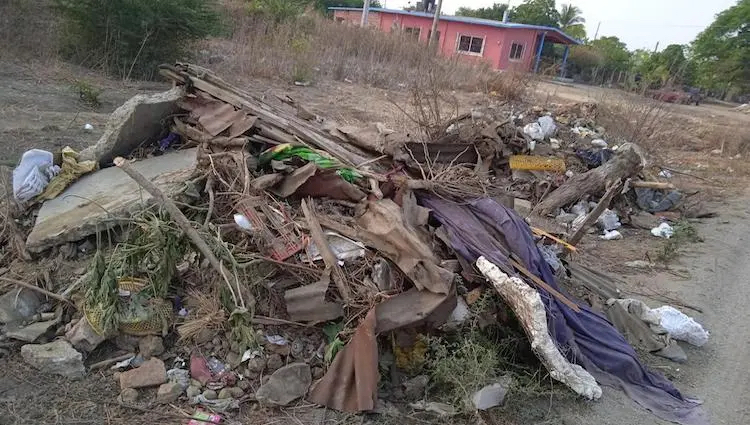
El defensor resalta también que, durante el bloqueo de abril contra la deforestación en el bosque comunal de Unión Hidalgo, elementos de la Policía Municipal agredieron a los habitantes que se manifestaban pacíficamente. Ante estas situaciones, destaca que, a diferencia de la época en la lucha contra el parque eólico, elementos de seguridad mantenían comunicación y vigilancia para su protección, cosa que ya no sucede.
“Cuando me puse contra el gobierno federal dejaron de venir a mi casa y dejaron de hablarme, entonces me dejaron al descubierto”, señala ante el riesgo de protestar por las obras actuales del megaproyecto del Corredor Interoceánico.
En ese contexto, para el defensor también es preocupante la intención de las autoridades federales, en coadyuvancia con la municipalidad de Juchitán, para instalar destacamentos de la Semar en la región. Esto en referencia que, en octubre del 2023, el alcalde Miguel Sánchez Altamirano entregó un acta de donación de un predio, ubicado en Pozo Peralta, a menos de 20 kilómetros de Unión Hidalgo, para la construcción de un destacamento de la Semar.
En un evento con la presencia del Vicealmirante, Juan Carlos Vera Minjares, jefe de la Unidad Coordinadora Semar CIIT, el edil afirmó que las instalaciones militares serán “para brindar seguridad a la Línea K del tren del Istmo de Tehuantepec y contribuir a la salvaguarda de las y los juchitecos”.

Un informe de labores de la Semar publicado un mes antes, en septiembre del 2023, enlista como obras en proceso a las Estaciones Navales en Ixtepec, así como Destacamentos militares en Matías Romero y Tehuantepec.
En cuanto al armamento de los marinos, el informe asegura que provee a las unidades de infantería y establecimientos navales comisionados al CIIT, y en particular a la Línea K, de equipo como drones, videocámaras, trajes de seguridad antimotín, placas balísticas, paneles balísticos y cascos balísticos.
Para diciembre del 2023, durante conferencia de prensa de la presidencia, el Vicealmirante Raymundo Pedro Morales Ángeles, director general del CIIT, aseguró que contabilizan 3 mil elementos de la Semar para vigilar el megaproyecto. Además, reportó el avance en la construcción de las instalaciones en Oaxaca y Veracruz, asegurando que “vamos a establecer estaciones navales en todo el corredor”.
“No puedes construir instalaciones militares en un territorio indígena tan fácilmente”, reclama Martín, quien defiende que en el caso de que se pretenda establecer cuarteles en tierras de Unión Hidalgo, primero tendría que pasar por la aprobación de sus habitantes.



